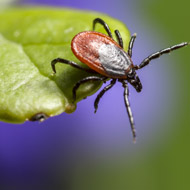
TBD Serochip can identify eight different pathogens
Scientists in America have developed a revolutionary new blood test for tick-borne diseases.
The Tick-Borne Disease Serochip (TBD Serochip) promises to make diagnosis easier, providing a single test for eight different tick-borne pathogens, including Lyme disease.
The research was led by the Centre for Infection and Immunity (CII) at Columbia University’s Mailman School of Public Health and reported in the journal Nature Scientific Reports.
Diagnosis of Lyme disease currently requires two separate tests and relies on subjective criteria for the interpretation of results. This complex approach accurately identifies less than 40 per cent of patients and provides false positives 28 per cent of the time.
Scientists report that the TBD Serochip can simultaneously test for the presence of antibodies in blood to more than 170,000 individual fragments of protein. In addition to Lyme disease, it can also identify Anaplasma, Babesia, Borrelia burgdorferi, Borrelia miyamotoi, Ehrlichia, Rickettsia, Heartland virus, and Powassan virus.
The TBD Serochip can also identify whether an individual is infected with more than one tick-borne pathogen, researchers say. Individual ticks are often infected with more than one agent; Ixodes scapularis ticks alone can transmit at least five human pathogens.
Evidence of exposure to other tick-borne pathogens in patients with Lyme disease has been well documented. In this latest paper, the scientists note finding antibodies to another agent in 26 per cent of blood specimens from patients with TBD.
“Diagnosing tick-borne illness is a difficult journey for patients, delaying effecting treatment,” says senior author W. Ian Lipkin. “The TBD Serochip promises to make diagnosis far easier, offering a single, accurate test for eight different TBDs. Early detection of infection enables rapid and appropriate treatment.”



 The latest
The latest